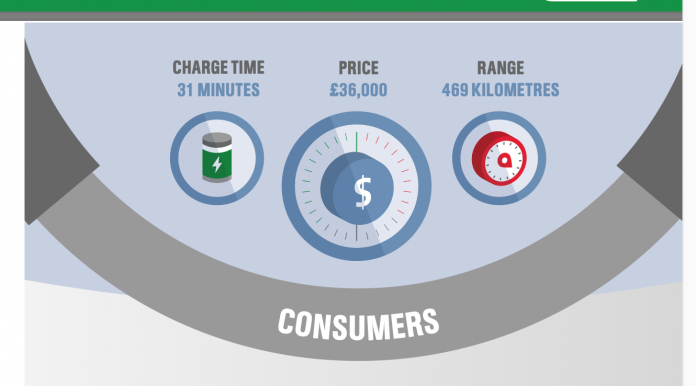As everyone who has watched Hamilton knows, the colonies once revolted against Mother England and won their independence. And yet the two nations have maintained a sibling relationship, and thus the results of a new study by Castrol provides some insight into the electric car marketplace.
The study, says the British oil company, points to the “tipping points” for electric vehicles to become mainstream in the UK.
Among those tipping points are a purchase price of £24,000 (or $30,000) for an EV, recharging of the battery in 30 minutes, and a range of at least 282 miles.
The study revealed that while people in many countries are willing to pay more for an EV, British drivers are not, which may be one reason that while current projections have EVs in the world’s mainstream in 2024, that milestone isn’t anticipated in the UK until 2025.
Castrol’s motivation for such a survey, it said, is its position as a “global leader” in providing special e-transmission fluids, e-coolants and e-greases for electric vehicles.
The company said the study draws on the views of consumers, fleet managers and automotive industry leaders in the UK.
“The automotive industry has been hit hard by the coronavirus pandemic, but I believe that electric vehicles have a central role to play in powering the sector’s low-carbon recovery,” said Omer Dormen, vice president of Castrol Europe.
“Castrol’s research shows that individual consumers are positive about making the switch to electric, but buyers in the UK expect to do so slightly later than those in other markets, and are keen to pay a bit less.
“As an industry we must focus on the factors that matter most to consumers.”
The full 48-page study, “Accelerating the EVolution” is available at the Castrol website.
Castrol also included in the study research from eight of the world’s “most important” EV markets and identified five “critical challenges” that need to be addressed to promote further growth in the EV market. It also highlighted the different priorities for consumers and fleet managers.
Among the findings:
- 64 percent of British consumers are taking a “wait-and-see” approach to EVs, and around 60 percent of fleet managers are waiting for their competitors to convert from petroleum to electric power for their vehicles.
- Price is the No. 1 priority for consumers, though British consumers want to pay no more than $30,000 while those in other countries would switch at the $36,000 plateau.
- 62 percent say that maintenance costs could keep them from going electric, to which Castrol notes that “many consumers are unaware that the overall average cost of ownership of an EV over its lifetime tends to be lower than an ICE (internal combustion engine) vehicle.”
- The No. 2 factor delaying purchase is charging times. Nearly 70 percent of consumers said EVs won’t dominate until charging times are the same as those of refueling an ICE.
- Range anxiety is real and was No. 3 on the list. What British buyers want is to be able to drive from London to Paris without having to recharge.
“The automotive industry has already demonstrated what it can achieve in response to the coronavirus pandemic, turning its capabilities to producing much needed medical equipment,” said Mandhir Singh, Castrol’s chief executive. “With EV technology constantly improving, the challenge now will be to drive a low-carbon recovery and accelerate the EVolution as quickly as possible.
“Bringing down the cost and charge time for electric vehicles while increasing range, infrastructure and vehicle choice will be critical to persuading consumers to make the switch.”







I bought a Tesla 3, 4+ months ago and just traded it in for a new Avalon Hybrid Limited. Why? Because I hated Tesla arrogance, the service and the lack of range in my Standard Range Plus. One day, a week and a half ago I happened in to the local Toyota dealership just for a test drive and walked out 3 hrs later with the Avalon. Since I paid cash for the Tesla, I was able to “swap” it out for the Avalon which gets 43/43 mpg with more luxury. I will probably go electric next time but may not do Tesla again
Range, cost, strip mining to make batteries, coal fired power plants to recharge them, dangerous and dirty to recycle, lack of places to recharge, etc. Just not a practical solution to any problem I am currently experiencing with my ICE vehicles.
TOTALLY IMPRACTICABLE; NO RANGE; REPLACEMENT BATTERY OUTRAGEOUSLY EXPENSIVE; NO SERVICE HISTORY; CATCH ON FIRE; NO FREE CHARGING STATIONS ANYWHERE ESPECIALLY ON THE INTERSTATES…………IN SUM JUST A CRAP FAD
NEVER BUY ONE ……. V8 FOR LIFE
The politicians and oil companies are doing everything they can to disrupt the electric car and keeping it from being the only car on the road
Shell bought the technology for a revolutionary design of a battery that will change the e-v industry and locked it away STUPID GREED THAT WILL DESTROY US AND OUR PLANET
While I agree with your conclusion about stupid greed, it must be noted that this same conspiracy theory was bandied about for years but about a miracle 100-mpg carburetor that was bought and hidden away by an oil company. Not true or logical then or now.